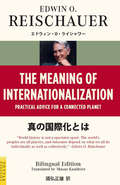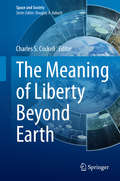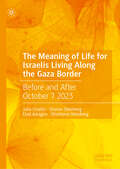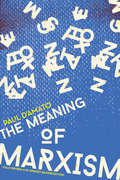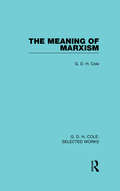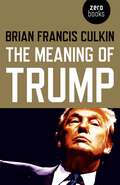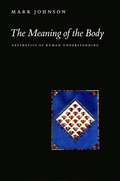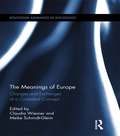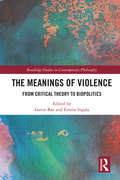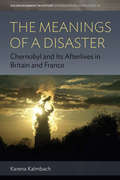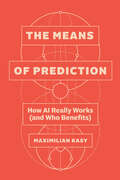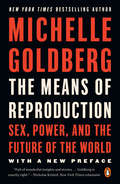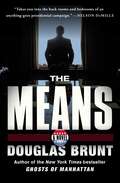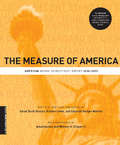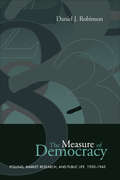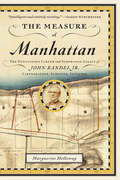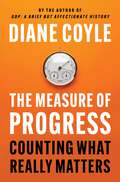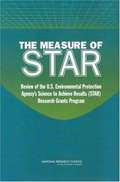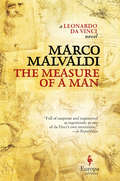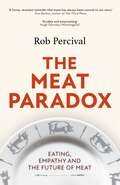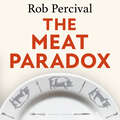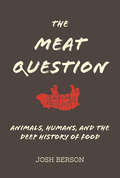- Table View
- List View
The Meaning of Internationalization
by Edwin O. Reischauer Masao KunihiroIn The Meaning of Internationalization, Edwin O. Reischauer--former American Ambassador to Japan and one of the world's most acclaimed scholars of Japanese life and culture--delivers a heartfelt message to the Japanese people on the need to look beyond their borders at the changing nature of the world. Reischauer stresses the need to adapt in order to survive and thrive in the new reality that our ever-shrinking world is bringing about--a message that resonates even more deeply today and applies not just to Japan, but to every country in the new global economy.
The Meaning of Internationalization
by Edwin O. Reischauer Masao KunihiroIn The Meaning of Internationalization, Edwin O. Reischauer--former American Ambassador to Japan and one of the world's most acclaimed scholars of Japanese life and culture--delivers a heartfelt message to the Japanese people on the need to look beyond their borders at the changing nature of the world. Reischauer stresses the need to adapt in order to survive and thrive in the new reality that our ever-shrinking world is bringing about--a message that resonates even more deeply today and applies not just to Japan, but to every country in the new global economy.
The Meaning of Liberty Beyond Earth
by Charles S. CockellThe purpose of this book is to initiate a new discussion on liberty focusing on the infinite realms of space. The discussion of the nature of liberty and what it means for a human to be free has occupied the minds of thinkers since the Enlightenment. However, without exception, every one of these discussions has focused on the character of liberty on the Earth. The emergence of human space exploration programs in the last 40-50 years raise a fundamental and new question: what will be the future of liberty in space? This book takes the discussion of liberty into the extraterrestrial environment. In this book, new questions will be addressed such as: Can a person be free when the oxygen the individual breathes is the result of a manufacturing process controlled by someone else? Will the interdependence required to survive in the extremities of the extraterrestrial environment destroy individualism? What are the obligations of the individual to the extraterrestrial state? How can we talk of extraterrestrial liberty when everyone is dependent on survival systems?
The Meaning of Life for Israelis Living Along the Gaza Border: Before and After October 7 2023
by Julia Chaitin Sharon Steinberg Elad Avlagon Shoshana SteinbergThis book explores the meaning of life for Israelis living along the Gaza border before and after October 7th. It brings together residents&’ personal stories and photographs, alongside their creative social media posts. This second edition builds on a groundbreaking longitudinal study conducted between 2018 and 2021, which examined how people made sense of their lives after two decades of ongoing conflict. Now expanded with new research carried out in the wake of the Hamas terror attack on October 7th, it offers a powerful comparison of how life in this region has been experienced and understood across two defining periods. Drawing on theories from social psychology and peacebuilding, the book weaves together a compelling narrative and visual portrait of Jewish-Israeli men and women living near the border. It also explores how their perceptions and emotions have shifted over time—regarding patriotism and Zionism, their Gazan neighbors, and their hopes and fears for the future at personal, family, community, regional, and national levels.
The Meaning of Marxism
by Paul D'Amato"In [D'Amato's] able hands, Marxist politics come alive and leap before us, pointing a way toward a better world. It's a knockout."--Dave Zirin, author of What's My Name, Fool?: Sports and Resistance in the United StatesIn this lively and accessible introduction to the ideas of Karl Marx, with historical and contemporary examples, D'Amato argues that Marx's ideas of globalization, oppression, and social change are more important than ever.Paul D'Amato is the associate editor of the International Socialist Review. His writing has appeared in CounterPunch, Socialist Worker, and SelvesandOthers.org. He is an activist based in Chicago.
The Meaning of Marxism (Routledge Library Editions)
by G. D. ColeThis book is largely based on What Marx Really Meant which was written by Cole and published in 1934. It is a revaluation of Marx's essential ideas and methods in relation to contemporary social structures and developments and considers the bearing of Marx's theories on the structure of social classes, which altered greatly since he formulated his account of them.
The Meaning of Trump
by Brian Francis CulkinThe election of Donald Trump was a shattering moment to the political sensibilities of America; immediately sending the country into a frenzy of commentary, critique, and a never-ending media coverage that has bordered on the absurd. But the question still remains: what does it all mean? The Meaning of Trump is an ideological critique that sees the election of Donald Trump as a completely natural progression to the general trajectory of digitized technologies, neoliberalism, and a new breed of financialized capitalism; destructive global forces that know no party affiliation or national boundary. Although Donald Trump is undoubtedly the symptom that has exploded to the surface after nearly four decades of failed policies and broken promises by both Republicans and Democrats alike, his election can also be seen as an existential fork in the road for both the United States and even humanity itself.What path is taken still remains to be seen.
The Meaning of the Body: Aesthetics of Human Understanding
by Mark JohnsonIn The Meaning of the Body, Mark Johnson continues his pioneering work on the exciting connections between cognitive science, language, and meaning first begun in the classic Metaphors We Live By. Johnson uses recent research into infant psychology to show how the body generates meaning even before self-consciousness has fully developed. From there he turns to cognitive neuroscience to further explore the bodily origins of meaning, thought, and language and examines the many dimensions of meaning—including images, qualities, emotions, and metaphors—that are all rooted in the body’s physical encounters with the world. Drawing on the psychology of art and pragmatist philosophy, Johnson argues that all of these aspects of meaning-making are fundamentally aesthetic. He concludes that the arts are the culmination of human attempts to find meaning and that studying the aesthetic dimensions of our experience is crucial to unlocking meaning's bodily sources. Throughout, Johnson puts forth a bold new conception of the mind rooted in the understanding that philosophy will matter to nonphilosophers only if it is built on a visceral connection to the world. “Mark Johnson demonstrates that the aesthetic and emotional aspects of meaning are fundamental—central to conceptual meaning and reason, and that the arts show meaning-making in its fullest realization. If you were raised with the idea that art and emotion were external to ideas and reason, you must read this book. It grounds philosophy in our most visceral experience.”—George Lakoff, author of Moral Politics
The Meanings of Europe: Changes and Exchanges of a Contested Concept (Routledge Advances in Sociology #118)
by Claudia Wiesner Meike Schmidt-GleimWhat is Europe? What are the contents of the concept of Europe? And what defines European identity? Instead of only asking these classical questions, this volume also explores who asks these questions, and who is addressed with such questions. Who answers the questions, from which standpoints and for what reasons? Which philosophical, historical, religious or political traditions influence the answers? This book addresses its task in three parts. The first concentrates on the controversies around the meaning of Europe. The second focuses on the role of the European Union. The third discusses Europe and its relations to different types of otherness, or rather, non-European-ness. The volume produces a complex and plural picture of the concepts, ideas, debates and (ex)changes associated with the concept of Europe, and has a clear significance for today’s debates on European identity, Europeanization, and the EU.
The Meanings of Rights
by Conor Gearty Costas DouzinasDoes the apparent victory, universality and ubiquity of the idea of rights indicate that such rights have transcended all conflicts of interests and moved beyond the presumption that it is the clash of ideas that drives culture? Or has the rhetorical triumph of rights not been replicated in reality? The contributors to this book answer these questions in the context of an increasing wealth gap between the metropolitan elites and the rest, a chasm in income and chances between the rich and the poor, and walls which divide the comfortable middle classes from the 'underclass'. Why do these inequalities persist in our supposed human rights-abiding societies? In seeking to address the foundations, genealogies, meaning and impact of rights, this book captures some of the energy, breadth, power and paradoxes that make deployment of the language of human rights such an essential but changeable part of so many of our contemporary discourses.
The Meanings of Violence: From Critical Theory to Biopolitics (Routledge Studies in Contemporary Philosophy)
by Gavin Rae Emma IngalaViolence has long been noted to be a fundamental aspect of the human condition. Traditionally, however, philosophical discussions have tended to approach it through the lens of warfare and/or limit it to physical forms. This changed in the twentieth century as the nature and meaning of ‘violence’ itself became a conceptual problem. Guided by the contention that Walter Benjamin’s famous 1921 ‘Critique of Violence’ essay inaugurated this turn to an explicit questioning of violence, this collection brings together an international array of scholars to engage with how subsequent thinkers—Agamben, Arendt, Benjamin, Butler, Castoriadis, Derrida, Fanon, Gramsci, Merleau-Ponty, Sartre, and Schmitt—grappled with the meaning and place of violence. The aim is not to reduce these multiple responses to a singular one, but to highlight the heterogeneous ways in which the concept has been inquired into and the manifold meanings of it that have resulted. To this end, each chapter focuses on a different approach or thinker within twentieth and twenty-first century European philosophy, with many of them tackling the issue through the mediation of other topics and disciplines, including biopolitics, epistemology, ethics, culture, law, politics, and psychoanalysis. As such, the volume will be an invaluable resource for those interested in Critical Theory, Cultural Studies, History of Ideas, Philosophy, Politics, Political Theory, Psychology, and Sociology.
The Meanings of a Disaster: Chernobyl and Its Afterlives in Britain and France (Environment in History: International Perspectives #20)
by Karena KalmbachThe disaster at the Chernobyl nuclear power plant was an event of obviously transnational significance—not only in the airborne particulates it deposited across the Northern hemisphere, but in the political and social repercussions it set off well beyond the Soviet bloc. Focusing on the cases of Great Britain and France, this innovative study explores the discourses and narratives that arose in the wake of the incident among both state and nonstate actors. It gives a thorough account of the stereotypes, framings, and “othering” strategies that shaped Western European nations’ responses to the disaster, and of their efforts to come to terms with its long-term consequences up to the present day.
The Means of Prediction: How AI Really Works (and Who Benefits)
by Maximilian KasyAn eye-opening examination of how power—not technology—will define life with AI. AI is inescapable, from its mundane uses online to its increasingly consequential decision-making in courtrooms, job interviews, and wars. The ubiquity of AI is so great that it might produce public resignation—a sense that the technology is our shared fate. As economist Maximilian Kasy shows in The Means of Prediction, artificial intelligence, far from being an unstoppable force, is irrevocably shaped by human decisions—choices made to date by the ownership class that steers its development and deployment. Kasy shows that the technology of AI is ultimately not that complex. It is insidious, however, in its capacity to steer results to its owners’ wants and ends. Kasy clearly and accessibly explains the fundamental principles on which AI works, and, in doing so, reveals that the real conflict isn’t between humans and machines, but between those who control the machines and the rest of us. The Means of Prediction offers a powerful vision of the future of AI: a future not shaped by technology, but by the technology’s owners. Amid a deluge of debates about technical details, new possibilities, and social problems, Kasy cuts to the core issue: Who controls AI’s objectives, and how is this control maintained? The answer lies in what he calls “the means of prediction,” or the essential resources required for building AI systems: data, computing power, expertise, and energy. As Kasy shows, in a world already defined by inequality, one of humanity’s most consequential technologies has been and will be steered by those already in power. Against those stakes, Kasy offers an elegant framework both for understanding AI’s capabilities and for designing its public control. He makes a compelling case for democratic control over AI objectives as the answer to mounting concerns about AI's risks and harms. The Means of Prediction is a revelation, both an expert undressing of a technology that has masqueraded as more complicated and a compelling call for public oversight of this transformative technology.
The Means of Reproduction: Sex, Power, and the Future of the World
by Michelle GoldbergA groundbreaking new work on the global battle over reproductive rights by the author of The New York Times bestseller Kingdom Coming Award-winning journalist Michelle Goldberg shows how the emancipation of women has become the key human rights struggle of the twenty-first century in The Means of Reproduction. Deeply reported across four continents, the book explores issues such as abortion, female circumcision, and Asia's missing girls to dramatize the connections between international policymaking and individual lives. Goldberg demonstrates how women's rights are key to addressing both overpopulation and rapid population decline, reducing world poverty, and retarding the spread of AIDS. Sweeping and ambitious, this is a must-read book for feminists, health and policy workers, and anyone concerned about the future of our world. .
The Means: A Novel
by Douglas BruntPart Primary Colors, part House of Cards, The Means takes you deep into high-stakes politics where everyone has something to hide.Tom Pauley is a conservative trial attorney in Durham, NC, who is tapped by GOP leaders to campaign for the Governor's mansion. His bold style makes him a favorite for a run at the White House. Mitchell Mason is the president-elect of the United States, pushed into politics by a father determined to create a political dynasty. Mason manages the White House with a personal touch that makes both friends and enemies. Samantha Davis is a child actor-turned-lawyer-turned-journalist, working her way up from the bottom in a competitive industry. She is determined and brilliant, and her dogged pursuit of a decade-old story could trigger a scandal that would upend the political landscape. New York Times bestselling author Douglas Brunt's "savage" (Publishers Weekly) prose creates an incisive portrait of ambition, power, and what it takes to win in the ruthless world of politics today.-old story could trigger a scandal that would explode the political minefield. Part Primary Colors, part House of Cards, The Means explores the characters and motivations behind high-stakes politics where everyone has something to hide, and they will do whatever it takes to achieve their ends.
The Measure of America: American Human Development Report, 2008-2009 (A Columbia / SSRC Book)
by Burd-Sharps SarahThe Measure of Americais the first-ever human development report for a wealthy, developed nation. It introduces the American Human Development Index, which provides a single measure of well-being for all Americans, disaggregated by state and congressional district, as well as by gender, race, and ethnicity. The Index rankings of the 50 states and 436 congressional districts reveal huge disparities in the health, education, and living standards of different groups. Clear, precise, objective, and authoritative, this report will become the basis for all serious discussions concerning the realization of a fair, just, and globally competitive American society.
The Measure of America: American Human Development Report, 2008-2009 (A Columbia / SSRC Book)
by Kristen Lewis Sarah Burd-Sharps Eduardo MartinsThe Measure of America is the first-ever human development report for a wealthy, developed nation. It introduces the American Human Development Index, which provides a single measure of well-being for all Americans, disaggregated by state and congressional district, as well as by gender, race, and ethnicity. The Index rankings of the 50 states and 436 congressional districts reveal huge disparities in the health, education, and living standards of different groups. Clear, precise, objective, and authoritative, this report will become the basis for all serious discussions concerning the realization of a fair, just, and globally competitive American society.
The Measure of Democracy: Polling, Market Research, and Public Life, 1930-1945
by Daniel RobinsonPoliticians, government officials, and public relations officers lean heavily on polling when fashioning public policy. Proponents say this is for the best, arguing that surveys bring the views of citizens closer to civic officials. Critics decry polling's promotion of sycophantic politicians who pander to the whims of public sentiment, or, conversely, the use of surveys by special interest groups to thwart the majority will. Similar claims and criticisms were made during the early days of polling. When George Gallup began polling Americans in 1935, he heralded it as a bold step in popular democracy. The views of ordinary citizens could now be heard alongside those of organized interest groups. When brought to Canada in 1941, the Gallup Poll promised similar democratic rejuvenation. In actual practice, traditionally disadvantaged constituencies such as women, the poor, French Canadians, and African Americans were often heavily underrepresented in Gallup surveys. Preoccupied with election forecasting, Gallup pollsters undercounted social groups thought less likely or unable to vote, leading to a considerable gap between the polling results of the sampled polity and the opinions of the general public. Examining the origins and early years of public opinion polling in Canada, Robinson situates polling within the larger context of its forerunners – market research surveys and American opinion polling – and charts its growth until its first uses by political parties.
The Measure of Manhattan: The Tumultuous Career and Surprising Legacy of John Randel, Jr., Cartographer, Surveyor, Inventor
by Marguerite Holloway"Randel is endlessly fascinating, and Holloway's biography tells his life with great skill."--Steve Weinberg, USA Today John Randel Jr. (1787-1865) was an eccentric and flamboyant surveyor. Renowned for his inventiveness as well as for his bombast and irascibility, Randel was central to Manhattan's development but died in financial ruin. Telling Randel's engrossing and dramatic life story for the first time, this eye-opening biography introduces an unheralded pioneer of American engineering and mapmaking. Charged with "gridding" what was then an undeveloped, hilly island, Randel recorded the contours of Manhattan down to the rocks on its shores. He was obsessed with accuracy and steeped in the values of the Enlightenment, in which math and science promised dominion over nature. The result was a series of maps, astonishing in their detail and precision, which undergird our knowledge about the island today. During his varied career Randel created surveying devices, designed an early elevated subway, and proposed a controversial alternative route for the Erie Canal--winning him admirers and enemies. The Measure of Manhattan is more than just the life of an unrecognized engineer. It is about the ways in which surveying and cartography changed the ground beneath our feet. Bringing Randel's story into the present, Holloway travels with contemporary surveyors and scientists trying to envision Manhattan as a wild island once again. Illustrated with dozens of historical images and antique maps, The Measure of Manhattan is an absorbing story of a fascinating man that captures the era when Manhattan--indeed, the entire country--still seemed new, the moment before canals and railroads helped draw a grid across the American landscape.
The Measure of Progress: Counting What Really Matters
by Diane CoyleWhy do we use eighty-year-old metrics to understand today&’s economy?The ways that statisticians and governments measure the economy were developed in the 1940s, when the urgent economic problems were entirely different from those of today. In The Measure of Progress, Diane Coyle argues that the framework underpinning today&’s economic statistics is so outdated that it functions as a distorting lens, or even a set of blinkers. When policymakers rely on such an antiquated conceptual tool, how can they measure, understand, and respond with any precision to what is happening in today&’s digital economy? Coyle makes the case for a new framework, one that takes into consideration current economic realities.Coyle explains why economic statistics matter. They are essential for guiding better economic policies; they involve questions of freedom, justice, life, and death. Governments use statistics that affect people&’s lives in ways large and small. The metrics for economic growth were developed when a lack of physical rather than natural capital was the binding constraint on growth, intangible value was less important, and the pressing economic policy challenge was managing demand rather than supply. Today&’s challenges are different. Growth in living standards in rich economies has slowed, despite remarkable innovation, particularly in digital technologies. As a result, politics is contentious and democracy strained.Coyle argues that to understand the current economy, we need different data collected in a different framework of categories and definitions, and she offers some suggestions about what this would entail. Only with a new approach to measurement will we be able to achieve the right kind of growth for the benefit of all.
The Measure of STAR: Review of the U.S. Environmental Protection Agency's Science To Achieve Results (STAR) Research Grants Program
by Committee to Review EPA's Research Grants ProgramThe report favorably reviews the U. S. Environmental Protection Agency's competitive research grants program, finding that it has yielded significant new findings and knowledge critical for EPA's decision-making process. Established in 1995, the grants program was designed to enable the nation's best scientists and engineers to explore new ways to safeguard the environment and protect public health. The program awards about $100 million a year in grants and fellowships to independent investigators, multidisciplinary teams, and graduate students at universities and nonprofit institutions.
The Measure of a Man: A Leonardo da Vinci Novel
by Marco MalvaldiThe acclaimed Italian author spins a tale of Renaissance innovation, intrigue and murder in this historical novel about Leonardo da Vinci.October 1493. Florence is still mourning the death of Lorenzo the Magnificent. Columbus&’ ships have only recently reached the New World, and Milan is experiencing a renaissance under the leadership of Ludovico il Moro. Not far from Milan&’s Castle, a peculiar man named Leonardo da Vinci lives above his workshop. Da Vinci doesn&’t eat meat, writes from right to left, and struggles to get paid by his employers. Yet his fame extends beyond the Alps, to the French court of Charles VIII. Charles has sent envoys on a mission to uncover the Italian inventor&’s rumored secret plans for an invincible mechanical knight. Meanwhile, after a man is found dead in the Castle&’s courtyard, il Moro turns to Da Vinci for help. Five hundred years after Leonardo&’s death, Marco Malvaldi combines literature, science, history, and mystery to bring back to life one of the greatest figures of the Renaissance.
The Meat Paradox: ‘Brilliantly provocative, original, electrifying’ Bee Wilson, Financial Times
by Rob PercivalOur future diet will be shaped by diverse forces. It will be shaped by novel technologies and the logic of globalisation, by geopolitical tensions and the evolution of cultural preferences, by shocks to the status quo - pandemics and economic strife, the escalation of the climate and ecological crises - and by how we choose to respond. It will also be shaped by our emotions. It will be shaped by the meat paradox.'Should we eat animals?' was, until recently, a question reserved for moral philosophers and an ethically minded minority, but it is now posed on restaurant menus and supermarket shelves, on social media and morning television. The recent surge in popularity for veganism in the UK, Europe and North America has created a rupture in the rites and rituals of meat, challenging the cultural narratives that sustain our omnivory.In The Meat Paradox, Rob Percival, an expert in the politics of meat, searches for the evolutionary origins of the meat paradox, asking when our relationship with meat first became emotionally and ethically complicated. Every society must eat, and meat provides an important source of nutrients. But every society is moved by its empathy. We must all find a way of balancing competing and contradictory imperatives. It is essential reading for anyone interested in the origins of our empathy, the psychology of our dietary choices, and anyone who has wondered whether they should or shouldn't eat meat.
The Meat Paradox: ‘Brilliantly provocative, original, electrifying’ Bee Wilson, Financial Times
by Rob PercivalOur future diet will be shaped by diverse forces. It will be shaped by novel technologies and the logic of globalisation, by geopolitical tensions and the evolution of cultural preferences, by shocks to the status quo - pandemics and economic strife, the escalation of the climate and ecological crises - and by how we choose to respond. It will also be shaped by our emotions. It will be shaped by the meat paradox.'Should we eat animals?' was, until recently, a question reserved for moral philosophers and an ethically minded minority, but it is now posed on restaurant menus and supermarket shelves, on social media and morning television. The recent surge in popularity for veganism in the UK, Europe and North America has created a rupture in the rites and rituals of meat, challenging the cultural narratives that sustain our omnivory.In The Meat Paradox, Rob Percival, an expert in the politics of meat, searches for the evolutionary origins of the meat paradox, asking when our relationship with meat first became emotionally and ethically complicated. Every society must eat, and meat provides an important source of nutrients. But every society is moved by its empathy. We must all find a way of balancing competing and contradictory imperatives. It is essential reading for anyone interested in the origins of our empathy, the psychology of our dietary choices, and anyone who has wondered whether they should or shouldn't eat meat.
The Meat Question: Animals, Humans, and the Deep History of Food (The\mit Press Ser.)
by Josh BersonA provocative argument that eating meat is not what made humans human and that the future is not necessarily carnivorous.Humans are eating more meat than ever. Despite ubiquitous Sweetgreen franchises and the example set by celebrity vegans, demand for meat is projected to grow at twice the rate of demand for plant-based foods over the next thirty years. Between 1960 and 2010, per capita meat consumption in the developing world more than doubled; in China, meat consumption grew ninefold. It has even been claimed that meat made us human—that our disproportionately large human brains evolved because our early human ancestors ate meat. In The Meat Question, Josh Berson argues that not only did meat not make us human, but the contemporary increase in demand for meat is driven as much by economic insecurity as by affluence. Considering the full sweep of meat's history, Berson concludes provocatively that the future is not necessarily carnivorous.Berson, an anthropologist and historian, argues that we have the relationship between biology and capitalism backward. We may associate meat-eating with wealth, but in fact, meat-eating is a sign of poverty; cheap meat—hunger killing, easy to prepare, eaten on the go—enables a capitalism defined by inequality. To answer the meat question, says Berson, we need to think about meat-eating in a way that goes beyond Paleo diets and PETA protests to address the deeply entwined economic and political lives of humans and animals past, present, and future.
